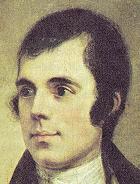
I hope we'll be forgiven for missing Brother Robert Burns' birthday by a few days. Burns' Night, celebrated around the world with Burns' Suppers, was January 25, his birthday.
Scottish-born Burns was a pioneer of the Romantic movement. He became a source of inspiration to the founders of both liberalism and socialism.
According to Wikipedia, Robert Burns joined as Entered Apprentice in Lodge St. David, Tarbolton on July 4, 1781. His initiation fee was 12s 6d. A visit to the Museum of Lodge Tarbolton (Kilwinning) sheds light on his Masonic associations.
Burns went with Lodge St. James, and on July 27, 1784, he was elected "Depute Master."
Burns' popularity aided his rise in Freemasonry. At a meeting of Lodge St. Andrew in Edinburgh in 1787, in the presence of the Grand Master and Grand Lodge of Scotland, Burns was toasted by the Worshipful Grand Master, Most Worshipful Brother Francis Chateris.
After a failed romance and no success at being a farmer, he was about to move to Jamaica to try his hand at bookkeeping when his brother persuaded him to have his poetry published. He became an overnight sensation in his native Scotland when his first book of poetry was published in June 1786.
The words of the traditional New Year's song, Auld Lang Syne, were written by Burns.
John Barleycorn: A Ballad
There was three kings into the east,
Three kings both great and high,
And they hae sworn a solemn oath
John Barleycorn should die.
They took a plough and plough'd him down,
Put clods upon his head,
And they hae sworn a solemn oath
John Barleycorn was dead.
But the cheerful Spring came kindly on,
And show'rs began to fall;
John Barleycorn got up again,
And sore surpris'd them all.
The sultry suns of Summer came,
And he grew thick and strong;
His head weel arm'd wi' pointed spears,
That no one should him wrong.
The sober Autumn enter'd mild,
When he grew wan and pale;
His bending joints and drooping head
Show'd he began to fail.
His colour sicken'd more and more,
He faded into age;
And then his enemies began
To show their deadly rage.
They've taen a weapon, long and sharp,
And cut him by the knee;
Then tied him fast upon a cart,
Like a rogue for forgerie.
They laid him down upon his back,
And cudgell'd him full sore;
They hung him up before the storm,
And turned him o'er and o'er.
They filled up a darksome pit
With water to the brim;
They heaved in John Barleycorn,
There let him sink or swim.
They laid him out upon the floor,
To work him farther woe;
And still, as signs of life appear'd,
They toss'd him to and fro.
They wasted, o'er a scorching flame,
The marrow of his bones;
But a miller us'd him worst of all,
For he crush'd him between two stones.
And they hae taen his very heart's blood,
And drank it round and round;
And still the more and more they drank,
Their joy did more abound.
John Barleycorn was a hero bold,
Of noble enterprise;
For if you do but taste his blood,
'Twill make your courage rise.
'Twill make a man forget his woe;
'Twill heighten all his joy;
'Twill make the widow's heart to sing,
Tho' the tear were in her eye.
Then let us toast John Barleycorn,
Each man a glass in hand;
And may his great posterity
Ne'er fail in old Scotland!
Robert Burns | Poetry | Romanticism
He wrote the Pocket Companion of the Hiram story. Neat!
ReplyDelete